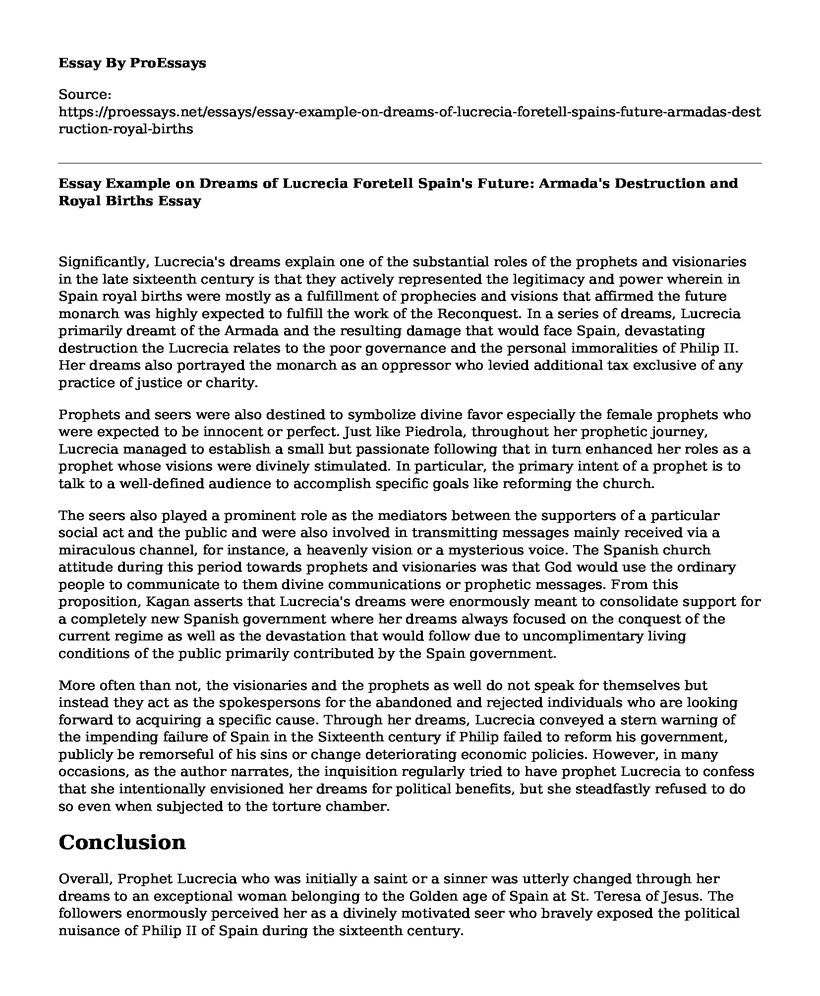Significantly, Lucrecia's dreams explain one of the substantial roles of the prophets and visionaries in the late sixteenth century is that they actively represented the legitimacy and power wherein in Spain royal births were mostly as a fulfillment of prophecies and visions that affirmed the future monarch was highly expected to fulfill the work of the Reconquest. In a series of dreams, Lucrecia primarily dreamt of the Armada and the resulting damage that would face Spain, devastating destruction the Lucrecia relates to the poor governance and the personal immoralities of Philip II. Her dreams also portrayed the monarch as an oppressor who levied additional tax exclusive of any practice of justice or charity.
Prophets and seers were also destined to symbolize divine favor especially the female prophets who were expected to be innocent or perfect. Just like Piedrola, throughout her prophetic journey, Lucrecia managed to establish a small but passionate following that in turn enhanced her roles as a prophet whose visions were divinely stimulated. In particular, the primary intent of a prophet is to talk to a well-defined audience to accomplish specific goals like reforming the church.
The seers also played a prominent role as the mediators between the supporters of a particular social act and the public and were also involved in transmitting messages mainly received via a miraculous channel, for instance, a heavenly vision or a mysterious voice. The Spanish church attitude during this period towards prophets and visionaries was that God would use the ordinary people to communicate to them divine communications or prophetic messages. From this proposition, Kagan asserts that Lucrecia's dreams were enormously meant to consolidate support for a completely new Spanish government where her dreams always focused on the conquest of the current regime as well as the devastation that would follow due to uncomplimentary living conditions of the public primarily contributed by the Spain government.
More often than not, the visionaries and the prophets as well do not speak for themselves but instead they act as the spokespersons for the abandoned and rejected individuals who are looking forward to acquiring a specific cause. Through her dreams, Lucrecia conveyed a stern warning of the impending failure of Spain in the Sixteenth century if Philip failed to reform his government, publicly be remorseful of his sins or change deteriorating economic policies. However, in many occasions, as the author narrates, the inquisition regularly tried to have prophet Lucrecia to confess that she intentionally envisioned her dreams for political benefits, but she steadfastly refused to do so even when subjected to the torture chamber.
Conclusion
Overall, Prophet Lucrecia who was initially a saint or a sinner was utterly changed through her dreams to an exceptional woman belonging to the Golden age of Spain at St. Teresa of Jesus. The followers enormously perceived her as a divinely motivated seer who bravely exposed the political nuisance of Philip II of Spain during the sixteenth century.
Bibliography
Kagan, Richard L. Lucrecia's dreams: Politics and prophecy in sixteenth-century Spain. Univ of California Press, (1995): 9-21.
Cite this page
Essay Example on Dreams of Lucrecia Foretell Spain's Future: Armada's Destruction and Royal Births. (2023, Jan 02). Retrieved from https://proessays.net/essays/essay-example-on-dreams-of-lucrecia-foretell-spains-future-armadas-destruction-royal-births
If you are the original author of this essay and no longer wish to have it published on the ProEssays website, please click below to request its removal:
- Essay Sample on Korean War: Ceasefire, Cold War, & the Rise of a Nuclear-armed North Korea
- Journey to the West: Epic Adventure in Search of Buddha's Sacred Scriptures - Essay Sample
- Race, Blackness & European Colonialism - Essay Sample
- Paper Sample on Yemen: World's Worst Humanitarian Crisis of the Decade
- Essay Sample on Mexican American Women's Rebellion Against Social Conventions During WWII
- Free Essay on 100 Years Since Women Gained Right to Vote: Imagining a World Without It
- Civilization in Mesopotamia, Egypt and China - Essay Sample







